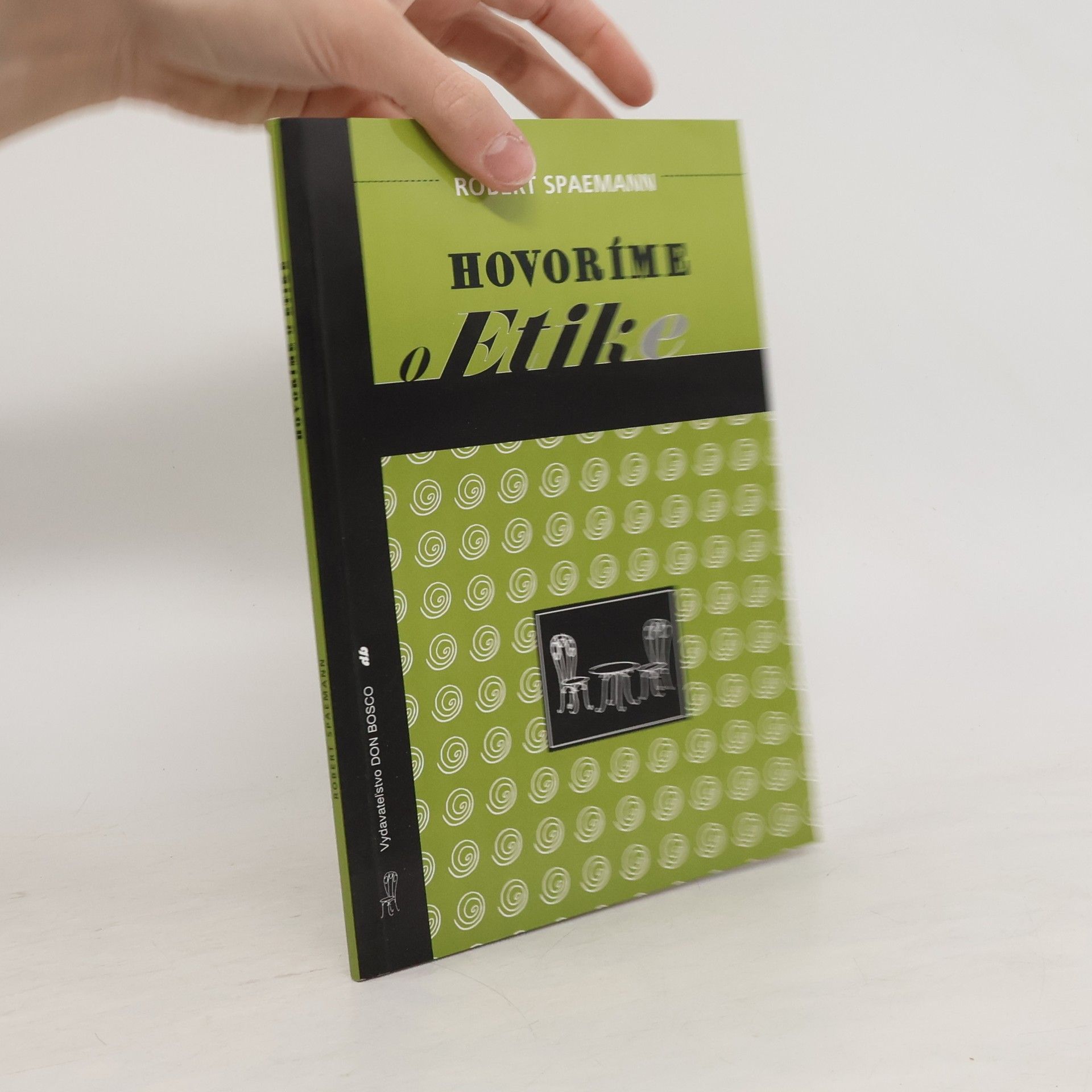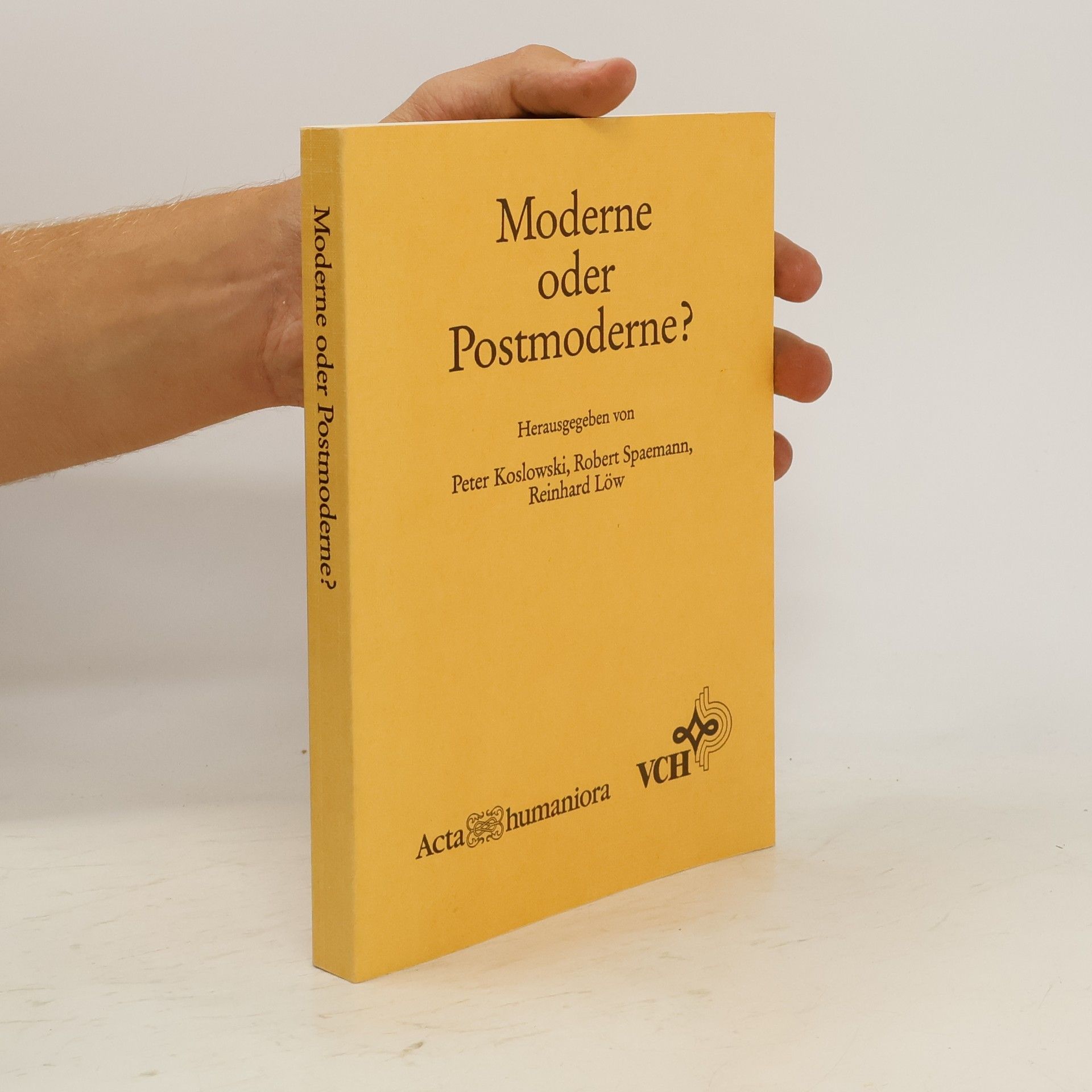Moderne oder Post-Moderne? Zur Signatur des gegenwärtigen Zeitalters
- 304bladzijden
- 11 uur lezen
Robert Spaemann was een invloedrijke Duitse filosoof, bekend om zijn diepgaande verkenningen van ethiek, antropologie en politieke filosofie. Zijn geschriften gingen vaak in op fundamentele vragen over het menselijk bestaan, de aard van bewustzijn en de morele grondslagen van de samenleving. Spaemann trachtte traditioneel filosofisch denken te verbinden met hedendaagse vraagstukken, waarmee hij lezers een weloverwogen perspectief bood op de complexiteit van de wereld. Zijn heldere en precieze stijl verdiende erkenning, en zijn werk blijft nieuwe onderzoeken naar filosofische concepten inspireren.







Podtitul: Pokusy o rozlišení mezi "něčím" a "někým" Kniha Osoby představuje poslední, třetí díl pomyslné trilogie, spolu s první knihou Účelnost jako filosofický problém a druhou Štěstí a vůle k dobru; obě knihy již dříve vyšly v českém překladu. V první se Spaemann věnoval dějinám a obhajobě teleologického pohledu na přírodu a člověka, ve druhé pak zejména etice, s cílem překonat dichotomii mezi eudaimonismem a deontologismem. Ve třetí knize, jejíž český překlad právě držíte v rukou, prohlubuje svou ontologii i etiku a přichází s propracovanou antropologií. Její jádro tvoří pozoruhodné promýšlení souvislostí mezi personalitou a přirozeností. V této knize o antropologii, avšak nikoli jen o ní, můžeme detailně sledovat Spaemannův specifický neoaristotelský přístup kontinentálního typu, v kontrastu k anglosaské lockeovské a humeovské tradici. Spaemann se zároveň snaží překonat tradici kartesiánského dualismu, a tak hledá cestu mezi Scyllou naturalistického monismu a Charybdou spiritualistického dualismu. Výsledkem je jeho teorie osob – nikoli teorie osoby v singuláru. Osoby mohou totiž existovat jen v plurálu. Přesto se Spaemann odmítl přihlásit k personalismu. Osoby však v jeho pojetí nejlépe charakterizuje schopnost učinit nebo přijmout slib a schopnost odpouštět.
Němečtí filosofové v základním interdisciplinárním díle podávají přehled dějin teleologického myšlení od antiky do současnosti a osvětlují odmítání teleologických jevů v novověké přírodní vědě. Ukazují, že antiteologické pozice ve vědě jsou vnitřně rozporné a vycházejí z předpokladů, které nelze v samotných přírodních vědách diskutovat. Autoři docházejí k závěru, že člověk vposled stojí před alternativou: buď interpretovat přírodu teleologicky, nebo chápat samotného člověka antropomorfisticky.
Studien über L. G. A. de Bonald
Philosoph der Restauration und Vater der Soziologie; gläubiger Christ und Ahnherr eines atheistischen Positivismus – diese Ambivalenz kennzeichnet die entscheidende, aber wenig bekannte Rolle des Vicomte de Bonald in der Geschichte der Gesellschaftslehre. Der Begründer des 'Traditionalismus' strebte vor allem die Bewahrung der theologisch-metaphysischen Tradition an, was sich in seiner Sprachphilosophie sowie seiner Theorie der Souveränität und Legitimität widerspiegelt. Dennoch hob Bonald die alte Metaphysik radikaler auf als die atheistischen Materialisten des 18. Jahrhunderts, indem er Philosophie und Religion als Funktionen der Gesellschaft betrachtete. Diese Diskrepanz zwischen Absicht und Wirkung zeigt sich bei diesem oft als erzkonservativ wahrgenommenen Denker. So beriefen sich sowohl Lamennais, der mit der 'christlichen Demokratie' assoziiert wird, als auch Charles Maurras auf Bonald, der aus einer Verbindung von Positivismus und Katholizismus ein totalitäres System ableiten wollte. Charles Péguy erkannte schließlich, dass der moderne intellektuelle Konservatismus einen radikaleren Bruch mit der abendländischen Tradition darstellt als die Französische Revolution und deren geistige Wegbereiter. Ein Wortführer aus einer uns heute ferngerückten Zeit erweist sich durch all diese Tatsachen als überaus aktuell.
Autor, profesor filozofie na univerzite v Mníchove, objasňuje v ôsmych kapitolách niektoré základné pojmy, ktoré všetci denne používame, keď hovoríme o morálnych aspektoch našich činov. Obsah: 1. Filozofická etika alebo: Je dobro a zlo relatívne? 2. Výchova alebo: Princíp potešenia a princíp reality 3. Vzdelanie alebo: Vlastný záujem a pocit hodnoty 4. Spravodlivosť alebo: Ja a tí druhí 5. Zmýšľanie a zodpovednosť alebo: Posväcuje cieľ prostriedky? 6. Jednotlivec alebo: Musíme vždy konať podľa svojho svedomia? 7. To bezpodmienečné alebo: Čo robí konanie dobrým? 8. Odovzdanosť alebo: Postoj k tomu, čo nemôžeme zmeniť Vydanie prvé
Pokus o nalezení etického základu, který by objasnil dualismus eudaimonismu a universalismu. ISBN 80-86005-01-0 je chybné, správné ISBN 80-86005-70-4 není v knize uvedeno.
Alles reale, in einer Gesellschaft geltende Ethos ist nicht selbstverständlich. Es trägt Spuren von Unwissenheit, Verdrängung, Unterdrückung. Ist es das Ethos der Herrschenden? Ist der Mißbrauch des Wortes "gut" sein häufigster Gebrauch? Die acht Kapitel dieses Buches erörtern ohne terminologischen Aufwand und ohne gelehrte Voraussetzungen einige jener Grundbegriffe, die wir alle täglich verwenden, wenn wir mit uns selbst oder mit anderen über den moralischen Aspekt unserer Handlungen zu Rate gehen. Der Autor nähert sich dabei der "familiären Unterredung", die Platon zur Erörterung ethischer Grundbegriffe empfohlen hat. INHALT: Vorwort 1. Philosophische Ethik oder: Sind Gut und Böse relativ? 2. Erziehung oder: Lustprinzip und Realitätsprinzip 3. Bildung oder: Eigeninteresse und Wertgefühl 4. Gerechtigkeit oder: Ich und die anderen 5. Gesinnung und Verantwortung oder: Heidligt der Zweck die Mittel? 6. Der Einzelne oder: Muß man imm seinem Gewissen folgen? 7. Das Ungedingte oder: Was macht eine Handlung gut? 8. Gelassenheit oder: Das Verhalten zu dem, was wir nicht ändern können
Er ist wie Günter Grass, Martin Walser und Joseph Ratzinger 1927 geboren, Zeitgenosse von Habermas und Enzensberger und sein Leben verlief so spannend wie kein zweites seiner Generation. Die Mutter war Tänzerin bei Mary Wigman, sein Vater Kunsthistoriker. Seine Eltern waren links, atheistisch und lebten in der Berliner Bohème der Zwanziger Jahre. 1942, nach dem Tod seiner Mutter, wird der Vater zum katholischen Priester geweiht. 1944 ist Spaemann bei einem Bauer untergetaucht, er ist Deserteur im eigenen Land. Entdeckt man ihn jetzt, wird er sofort erschossen. Heute ist Robert Spaemann der bedeutendste konservative Philosoph im In und Ausland. In einem langen Gespräch mit Stephan Sattler resümiert er sein Leben, ganz unter der Maxime der Suche nach dem, "was in Wahrheit ist". Spaemann ist der bedeutendste konservative Philosoph im In- und Ausland und bekennender Gegner der Nutzung der Atomkraft und der Genmanipulation.